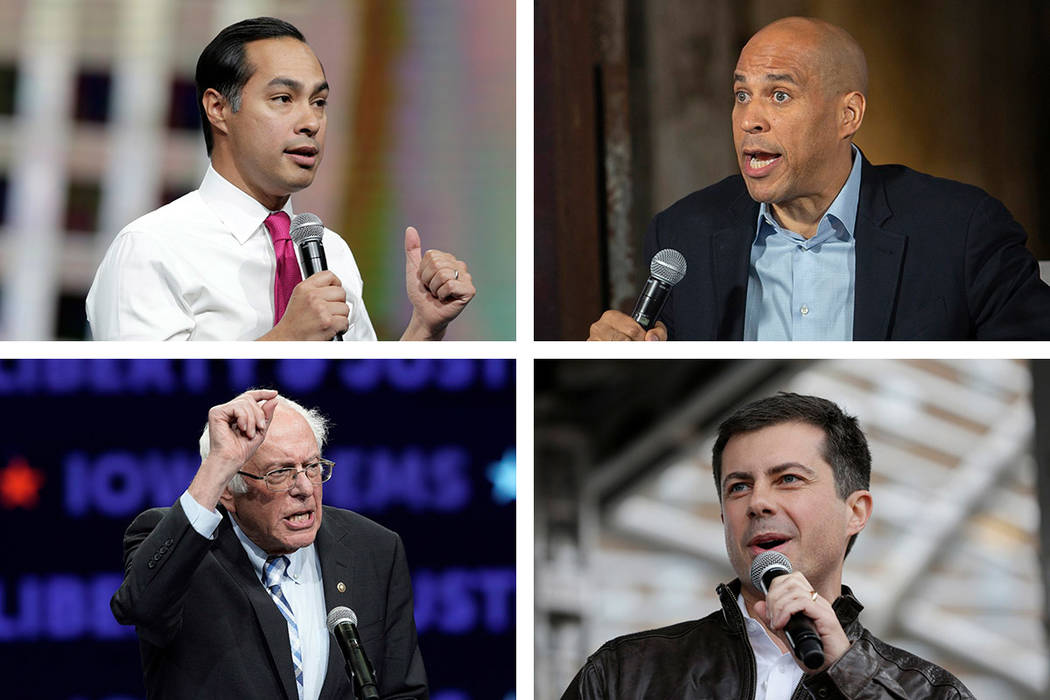Las Vegas homeless ordinance becomes national campaign issue
The Las Vegas City Council passed a hotly debated camping ban on Wednesday after suffering a social media barrage from many within the 2020 Democratic presidential nomination field.
By Wednesday, eight leading presidential candidates had voiced public opposition to the ban: former Housing and Urban Development Secretary Julián Castro, Sen. Elizabeth Warren, D-Mass., businessman and activist Tom Steyer, Sen. Cory Booker, D-N.J., Sen. Bernie Sanders, I-Vt., former Vice President Joe Biden, Sen. Kamala Harris, D-Calif., and South Bend, Indiana, Mayor Pete Buttigieg.
The candidates have mostly echoed opponents’ criticism that the law — which allows police to cite people sleeping in certain public places if they refuse to leave or go to a homeless shelter — criminalizes homelessness. It passed Wednesday on a 5-2 vote.
The ban is the latest local issue taken on by a field eager to please Nevada’s early caucus voters. Most have also opposed the federal government’s plan to store nuclear waste at Yucca Mountain and the possible expansion of the Air Force’s Nevada Test and Training Range into the Desert National Wildlife Refuge.
But the Las Vegas ordinance is unique in that half of the candidates voicing opposition have spent time running their own cities: Castro, Booker, Sanders and Buttigieg. Given this executive experience, the Review-Journal asked candidates how they addressed homelessness on a city level.
Castro
The former mayor of San Antonio was the first and most visible critic of the proposed ban, having participated in a local protest in a recent campaign stop. During his time as mayor, San Antonio established a housing courtyard used as a model by cities including Las Vegas.
As the former housing secretary, Castro helped cut veteran homelessness by 30 percent during his time in the Obama administration.
During his campaign, he has toured the storm drains under Las Vegas, where some people seek shelter, and handed out meals in west Las Vegas. He released a comprehensive housing plan, which would expand housing vouchers as entitlements, add a rental tax credit and invest in housing development.
In a tweet sent shortly after the Review-Journal’s inquiry, Castro offered several of his presidential platforms before quipping: “But first you have to see people without homes as… people. Shocking.”
“(Castro) was the first candidate to commit to ending homelessness (by 2028) and the first to release a plan on how to do it,” national press secretary Sawyer Hackett said Wednesday. “We’re happy to see other candidates follow his lead on this because housing isn’t a backburner issue for most Americans, and it won’t be a backburner issue when he’s president.”
Sanders
The Sanders campaign provided a detailed accounting of the senator’s former actions on homelessness during his time as mayor in his hometown of Burlington, Vermont.
His administration developed a community land trust and the Committee on Temporary Shelter, which acquired and renovated housing to provide emergency overnight shelters, transitional units for families and women, and permanent affordable housing. Both are still in use today some 30 years later.
Sanders also battled the owner of the city’s largest affordable housing complex when he attempted to use a loophole to convert the homes into luxury units.
If elected president, Sanders would expand his Burlington model nationwide with investments in community land trusts. He unveiled his $2.5 trillion affordable housing plan, which includes a nationwide rent control proposal, during a September campaign stop in Las Vegas.
Sanders’ signature “Medicare for All” plan, the campaign said, would also help to address homelessness by ensuring all Americans have a right to free mental health care and substance abuse counseling.
Buttigieg
Some national news stories, such as a June New Yorker piece, have cast doubt on Buttigieg’s record on addressing homelessness and lifting diverse communities. But the campaign for the only sitting mayor in the presidential race provided several examples of his work on homelessness at the city level.
During his first years in office, South Bend saw a 24 percent drop in homelessness.
He appointed committees to study the issue, joined national coalitions combating veteran homelessness and partnered with the South Bend Heritage Foundation to build two shelters.
Earlier this year, the campaign noted, he set aside $1.5 million in city funds to marry with $2.3 million in state and federal grants to build new, permanent housing.
Buttigieg has yet to release an affordable housing plan as part of his presidential platform.
Booker
Booker, a former tenants’ rights lawyer turned Newark mayor, moved to a public housing project more than 20 years ago to better address the needs of low-income communities, his campaign said.
As mayor, Booker doubled the rate of affordable housing production, building more than 300 new homes and apartments for people with disabilities. He also secured grants used for funding long-term programs.
Contrary to the Castro campaign’s statements, Booker appears to have been the first candidate to release an affordable housing plan with an element dedicated to eradicating homelessness.
Booker favors a renter’s credit and a baby bond program that he believes could provide many low-income Americans with the means to buy their first homes. He proposes rolling back housing aid requirements, enforcing anti-discrimination rules and funding housing aid programs through the Department of Housing and Urban Development.























